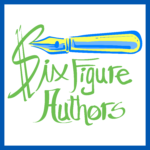This week, we did a second episode discussing what Andrea learned as an instructor and attendee of Kris Katheryn Rusch and Dean Wesley Smith’s annual business master class for authors. The topics discussed include licensing your work (for gaming, merchandise, etc.), branding, contract negotiations, and podcasting fiction to build an audience. Just a reminder in case you missed episode 11, the workshop was all about long-term business strategies for writers and independent publishers.
Licensing and the gaming industry
In this talk, they touched on working for hire, keeping your brand growing (if it’s not growing, it’s shrinking), working with good people (there are lots of them – walk away if you meet a jerk), how gamers will continue to buy games forever (true fans of a product buy from that product all the time), crowdsourcing.
They’re looking for authors to write for existing game worlds and also interested in licensing the intellectual property of authors who have created their own successful worlds in their books.
For authors interested in creating their own worlds and maintaining full control of their rights, you can check out gaming POD companies such as https://www.thegamecrafter.com/ and https://www.drivethrurpg.com/.
Branding
Branding is marketing at an advanced level. It’s more than just covers. It involves your website, social media, all of the products related to that brand (if you have more than one series, you need to brand them separately), your name, your company, even how you conduct yourself online and in public.
Different types of brands:
- Organization Brand (usually publishing company fits here)
- Service Brand (Provides a service like nonfiction authors)
- Product Brands (a series can fit here.)
- Personality Brands (authors fit here) If you have a personality brand, everything you do reflects that brand.
You can be more than one type of those brands. Highly successful authors are often a blend of Personality Brands, Service Brands, and Product Brand.
If you write in multiple series and/or across genres, you may want to build a brand deck. This is sort of like a media page. It puts all of the necessary information for that brand in one spot. When you approach cover designers, you give them the brand deck as a point of reference.
Licensing Tips
It is something that mid-list authors can look into, not just mega sellers. Traditionally published authors who didn’t sign anyway rights beyond ebook/print/audio can also do licensing deals on their own. Check out the Las Vegas Licensing Expo if you’re interested in pursuing deals.
Selling Direct and Podcasting Your Fiction
These panels went over ways to sell everything from ebooks and books to merchandise on your site, and we also discussed whether it’s worth it to try to make merchandise on your own.
For podcasting, we talked about using Bookfunnel (now allowing audio files up to two hours on their site) to deliver short stories, excerpts, and AI-read versions of books (this isn’t currently allowed on the Audiobook retail sites) for sale or for bonus extras.
Contracts and Negotiations
They suggested doing as much of the deal yourself and were adamant that you don’t need an agent for this stuff (an agent might even hurt your chances, because they’ll only do it if they feel it’s worth their time for the cut they’ll get).
If you get an offer, don’t show your excitement. Dealing with licensing people is generally better than dealing with Hollywood (Hollywood is known for screwing authors), but do everything by email so there’s a record.
For in-depth information, Kris has a book on this: Closing the Deal…on Your Terms: Agents, Contracts and Other Considerations

As much as I would like to believe Harlequin had their act together enough to write to a new category (Amazon), the Harlequin Medical line of category-length romances has been around since 2001. They were actually late to the game as Mills & Boon has had their Medical line since 1977. I don’t believe the medical line was available to buy in print in stores like Romantic Suspense, Special Edition, Presents, Desire, etc. as it was strictly mail order before they went digital as well. But I may be wrong about that. (Harlequin bought Mills & Boon decades ago, but they maintained some separate lines for a long time).
The ones I looked at were all released on November 1st 2019, but it’s very possible they just released ebook versions of old material they had the rights to. Still, for a trad publishers to notice a new category popped up on Amazon and get stuff in there in six months is pretty good, even if it was just recategorizing old things. I remember indies had the steampunk category to themselves for a long time when it first appeared. 😀
Just finished listening to all the episodes on the road home from PA. Very good, and some intimidating, information for a wannabe working on his first book. Looking forward to more.
Also, the generally accepted pronunciation for MMORPGs is “MORE PIGS”
lol, I’ve not heard that pronunciation, Adrian. I don’t know if you’re messing with me or being serious, but thanks for stopping by. 😀
Ha ha ha! I’m going to have to ask my brother what he thinks about that one. 😀 That’s fantastic, if it’s accurate. 😀